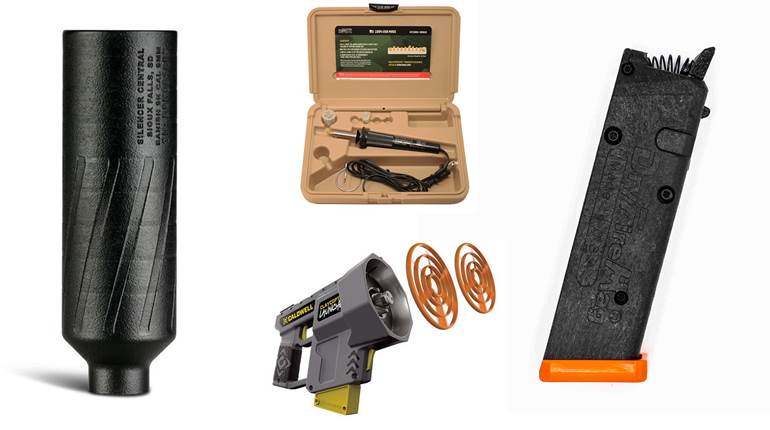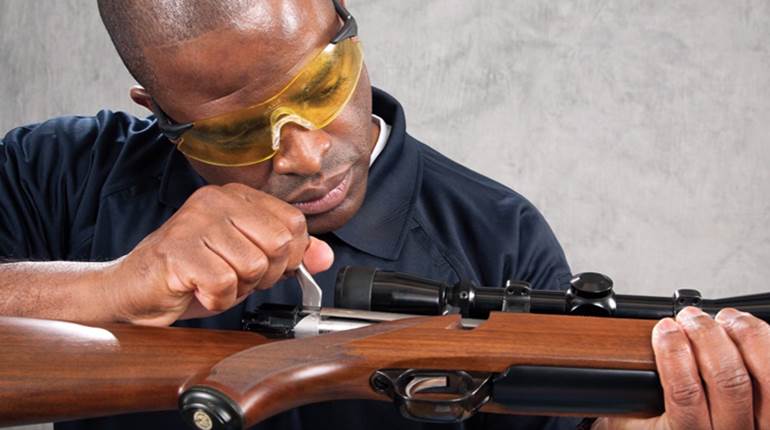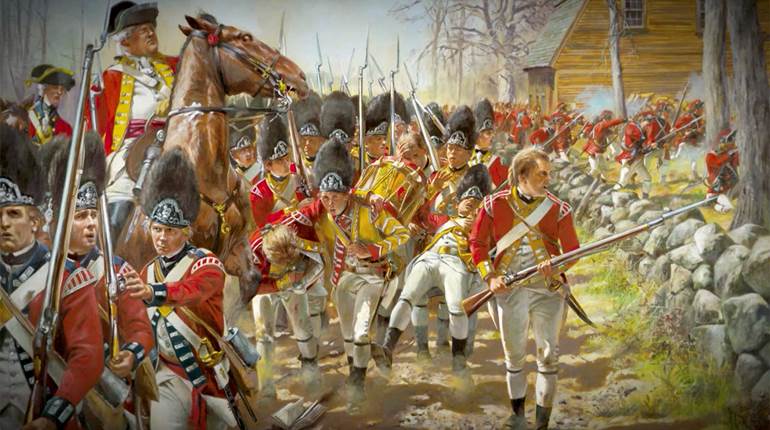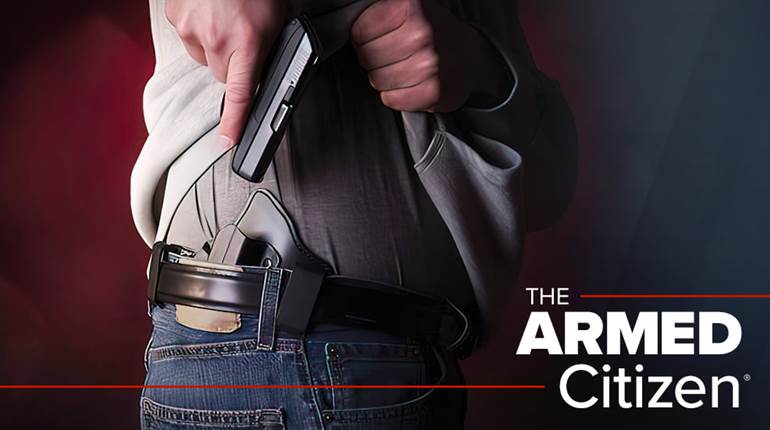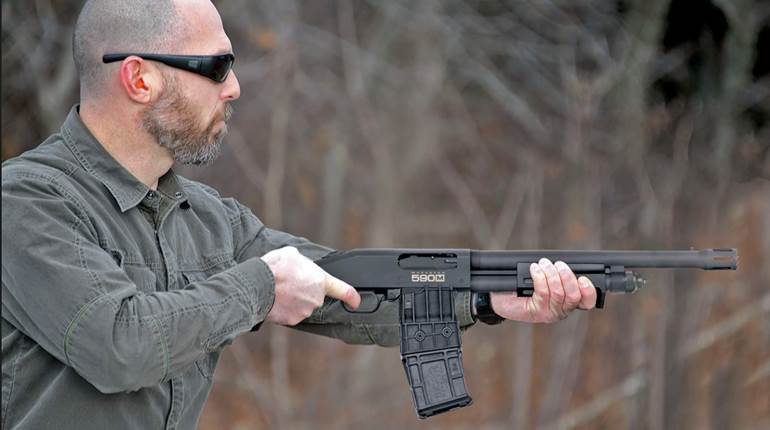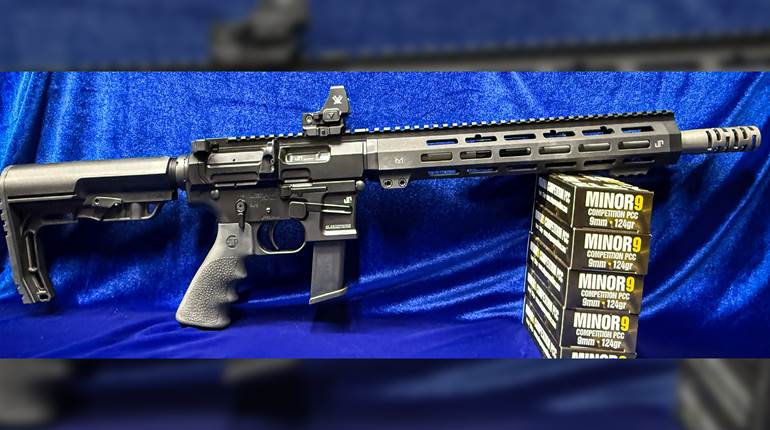
It used to be a rote ritual: At the end of each shooting session, if you wanted your gun to last, you had better make sure that you thoroughly clean it. Even after the transition to smokeless powder from the old hydroscopic black powder residue, primers were made from corrosive salts, and a barrel could be ruined overnight. Because the fouling was relatively massive, many guns were manufactured with somewhat loose tolerances in order for them to function reliably.
As gun technology marches on, propellants, primers and bullets create less fouling than their predecessors, tolerances have been tightened up significantly, and metal finishes have been developed that are so hard and slick that fouling as we know it can be almost eliminated. The dream is for a truly maintenance-free firearm. We’re not there yet, but we are getting closer.
 A significant part of the technological improvements in firearms is gun cleaning. Old-school gun cleaning usually involved a worn-out piece of flannel shirt, a jointed rod that shook like a constipated dog when you put a load on it, a small vial of Hoppes No. 9, followed with one last patch soaked with something called “gun oil.” You held the gun the best way you could, and often caused as much damage to your gun as a schoolboy would do dragging it home behind him from an afternoon rabbit hunt.
A significant part of the technological improvements in firearms is gun cleaning. Old-school gun cleaning usually involved a worn-out piece of flannel shirt, a jointed rod that shook like a constipated dog when you put a load on it, a small vial of Hoppes No. 9, followed with one last patch soaked with something called “gun oil.” You held the gun the best way you could, and often caused as much damage to your gun as a schoolboy would do dragging it home behind him from an afternoon rabbit hunt.
Today almost every gunner has a cradle to hold his gun while he cleans it. Most dedicated shooters know that one-piece rods are de rigueur, and everyone has a favorite solvent and lubricant. Since I am almost constantly cleaning guns because of my work, I have found some new products and techniques that do the job quicker and more thoroughly. Too, there are some time-proven products I will not be without.
Lyman Revolution Gun Vise 
The folks at Lyman have just come out with a new cradle that is one of the most versatile ones I have worked with. Its Revolution Rotating Gun Vise is a sturdy cradle that adjusts for length along a pair of steel tubes and has a fore-end support with two inserts that can handle anything from a bolt-action rifle to an AR or even a handgun. The Revolution Rotating Gun Vise has a wide footprint for stability, and one thing I really like is the four built-in slots to hold all my cleaning rods ready for use. It also has a tray that fits between the tubes and can hold patches, jags and other accessories. The Revolution Rotating Gun Vise has become the centerpiece of my gun cleaning center.
Dewey Cleaning Rods 
Dewey has been around for
quite a while—since 1975—and most recognize that Dewey rods are the best made gun cleaning rods. The stainless steel rods are stiff for their length, and the nylon coating protects the rifling in your barrel from scratches. A robust plastic handle has a bearing in it that freely rotates. Rod diameters are available for rifles from .17 up to .50 caliber.
Sinclair O-Ring Bore Guide 
Sometimes the simpler, the better, and this is certainly true when it comes to bore guides. I have had a number of bore-guide kits over the years. Like just about anything that’s made to handle A to Z, neither A or Z is handled efficiently. Sinclair O-Ring Bore Guides could not be more simple or effective. A caliber-specific Delrin plastic tube with an O-ring seal in the chamber area centers the cleaning rod in the bore of your rifle. There are no adapters to come off and drop; no ersatz handles that never seem to fit the bolt-handle recess or any other parts that always seem to vanish between cleaning sessions. I have two: one for standard .30-06 based cartridges, which handles everything from .22-250 Rem. to .30-06 and a magnum bore guide for my belted magnums. I should get a third to handle my .223 Remingtons.
Swab Its
Swab Its and its sister Bore Tips have been around for about five years. Most of us have used the ubiquitous Q-Tip to clean the nooks and crannies of our guns and accessories. Swab Its and Bore Tips offer replacement swabs that are more specifically geared toward a particular gun application. The latest from this company are Bore Whips for .17- and .22-caliber barrels. They feature a synthetic foam swab to hold solvent or lubricant and a long plastic “whip” to run the swab through the barrel. The thing I particularly like about these swabs is that they last noticeably longer than Q-Tip or cotton patch. Soak a dirty swab in solvent, squeeze out the excess, and it can be reused again. I haven’t done a thorough test of them, but I usually can get through three or four cleanings before I need to replace one. The .17-caliber whips go with me on a varmint shoot because my T/C Contender in .17 HMR needs to be tidied up every 25 to 30 rounds to maintain its accuracy, and I don’t like bringing a whole cleaning kit along in the field.
Cleaners, Lubricants and Solvents
Everything old is new again—or so it seem s. Yep, Hoppes No.9 is still available, and it does a great job of dissolving and washing away fouling. Because some rifles are driving bullets significantly faster, copper jacket fouling can be a bigger bug-a-boo, so solvents like Sweet’s 7.62 and Butch’s Bore Shine have been developed to deal with this antagonizing problem. Montana Extreme is another excellent solvent to deal with copper fouling. All of these rely on heavy doses of ammonia to do the dirty work, so protect your respiratory system, eyes and skin when you use them. I have first-hand experience in learning where small fissures in my skin or cuticles are by using these products bare handed. Don’t replicate my dumb mistakes.
s. Yep, Hoppes No.9 is still available, and it does a great job of dissolving and washing away fouling. Because some rifles are driving bullets significantly faster, copper jacket fouling can be a bigger bug-a-boo, so solvents like Sweet’s 7.62 and Butch’s Bore Shine have been developed to deal with this antagonizing problem. Montana Extreme is another excellent solvent to deal with copper fouling. All of these rely on heavy doses of ammonia to do the dirty work, so protect your respiratory system, eyes and skin when you use them. I have first-hand experience in learning where small fissures in my skin or cuticles are by using these products bare handed. Don’t replicate my dumb mistakes.
I shoot a fair amount of black powder cartridge guns, and the best cleaner by far is plain old non-ammoniated Windex. It’s the clear one, not the blue solution. A couple of wet patches and some hot water is all it takes to vanquish black powder residue from my Colts, Winchesters and Sharps guns. I usually follow all solvents with brake cleaner, available from most automotive maintenance suppliers. Brake cleaner is nothing but alcohol under high pressure, so be sure to wear eye protection when you use it. The alcohol acts as a degreaser and a drying agent displacing any water or moisture.
Manufacturers love to tout their lubricants as new and innovative, but in reality, once again, there is little new under the sun. I’ve used most of them, and they have all done a pretty decent job of keeping things slip-sliding along and turning away corrosion, but the best seems to be a product invented in 1904—Ballistol. Developed by a pair of chemistry professors for the German military, Ballistol is the original CLP—cleaner, lubricant and penetrant. It is the cleanest lubricant I have ever used, and it can even be used on leather. It does have a unique odor, but it’s not obnoxious. Ballistol has replaced virtually every other oil in my gun box with the exception of Kroil. 
Available from Brownells, Kroil is a penetrating oil that can crawl into the tiniest space to free up a sticky screw, bolt or other gun part. It can even creep between bullet fouling in a barrel and shorten the time necessary to remove that nasty stuff. I never paid much attention to it until I received a sample of it, but now I would not be without a can of Kroil on my gun bench. 
Another oldie-but-goodie is J-B Bore Compound, developed by a gunsmith in the 1960s. I haven’t been without a jar of this stuff in 40 years. J-B Bore Compound is a non-embedding abrasive that cuts through about any kind of junk that can accumulate inside a gun barrel. Back when I played gunsmith I made a pair of sawbucks a couple of times a year when a guy would come in complaining that his gun—rifle or pistol—had lost its accuracy. Smear a liberal amount of it on a patch, wrap it around a bore brush, and run it through the bore. Try it sometime on a barrel you think you have cleaned. You’ll be amazed at what that patch picks up.
Today’s closely fitted guns often require some grease to keep them running properly. There are a number of gun greases available, and all seem to do a decent job. I’ve gone to plain old lithium EP automotive grease to keep things that slide sliding. A dollop of grease from a tube that I use to grease my tractor is in a small vial in my gun kit. It’s a lot less expensive than the gun greases marketed today and does just as good a job.
Specialty Accessories
There are a few special accessories I have found that make the otherwise time-consuming and disagreeable chore of gun cleaning more efficient and less onerous. The so-called M-16 cleaning brush—a double-ended brush with a large brush on one end and a smaller one on the other—does yeoman’s service cleaning the gunk out of nooks, crannies, revolver ratchets and cylinder window corners. An old-fashioned shaving brush is handy to knock off dust and other loose debris.
 From the “How did I ever get along without this?” department, a company called Calbico makes a little plastic channel cleaning tool, Model F1, that is perfect for cleaning the slide rails of your pistol. Take a patch or piece of paper towel, soak it with solvent or brake cleaner and use this tool to run it up and down the slide rails. And to clean those nasty carbon deposits from the bolt of your AR, the Carbon Removing Tool, made by Aux Arc
From the “How did I ever get along without this?” department, a company called Calbico makes a little plastic channel cleaning tool, Model F1, that is perfect for cleaning the slide rails of your pistol. Take a patch or piece of paper towel, soak it with solvent or brake cleaner and use this tool to run it up and down the slide rails. And to clean those nasty carbon deposits from the bolt of your AR, the Carbon Removing Tool, made by Aux Arc  Manufacturing will keep you from using the “gun cleaning language” your wife or girlfriend finds so objectionable. Both of these little tools will immediately become can’t-live-withouts once you try them.
Manufacturing will keep you from using the “gun cleaning language” your wife or girlfriend finds so objectionable. Both of these little tools will immediately become can’t-live-withouts once you try them.
A lot of the products mentioned here are available at any well-stocked gun shop, but all can be purchased through Brownells. If you don’t have their catalog or are not on their e-mail list, you are cheating yourself. I’ve been doing business with them for more than 40 years, and they are without a doubt the classiest, most helpful and fair people I have ever done any business with, in or out of the gun industry.












